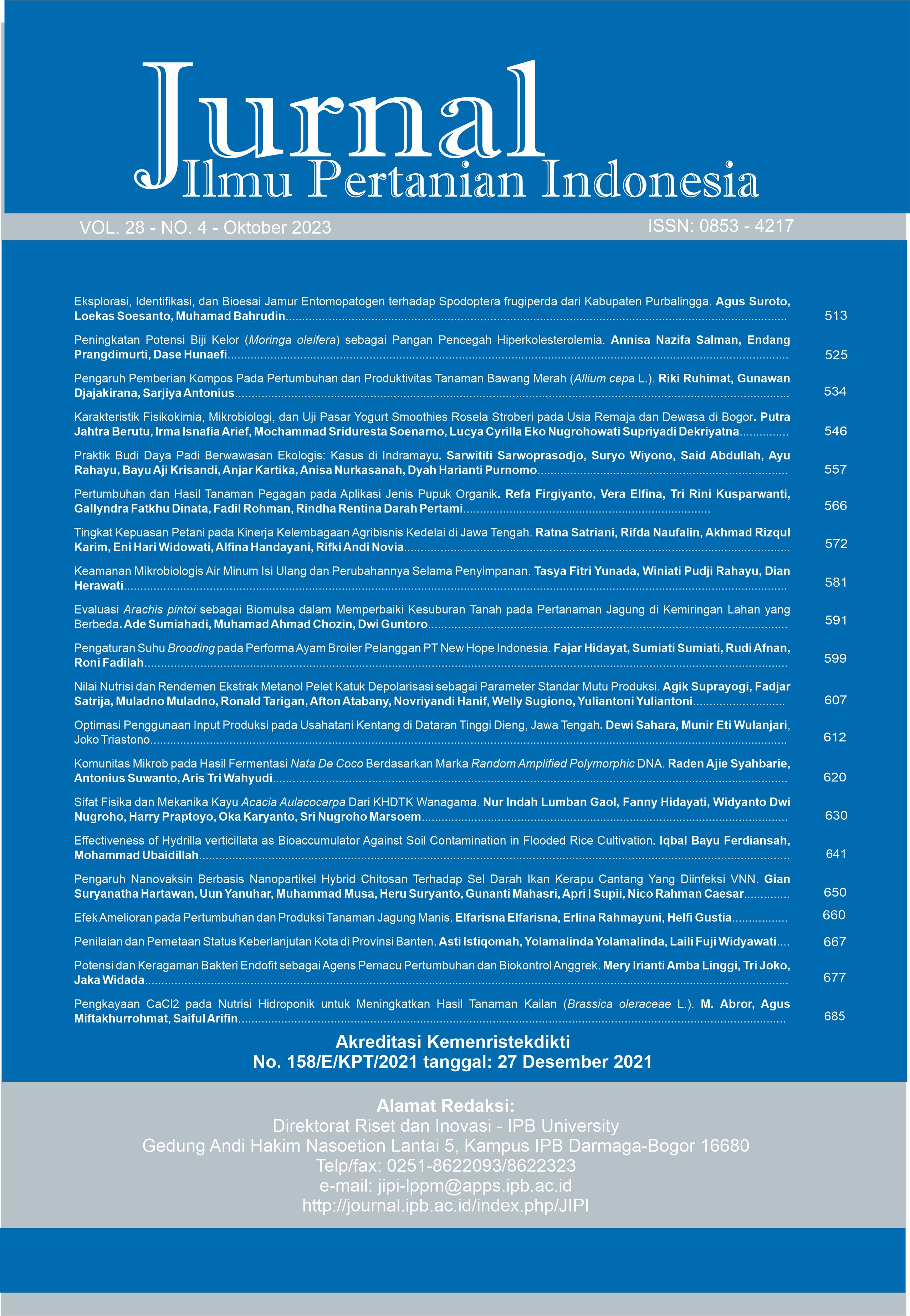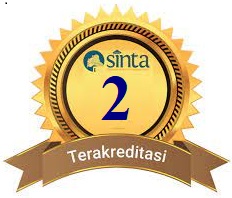Evaluasi Arachis pintoi sebagai Biomulsa dalam Memperbaiki Kesuburan Tanah pada Pertanaman Jagung di Kemiringan Lahan yang Berbeda
Abstract
Expanding agricultural land by using sloping dry land can be detrimental to the environment due to soil erosion and degradation. However, cover crops can be one of the technologies applied to reduce these risks. Arachis pintoi is one of cover crops that can be used as bio mulch on agricultural land. The study aimed to evaluate the effect of A. pintoi bio mulch on soil nutrient contents and maize plant growth at different slopes. A nested randomized block design was used in the study. Two levels of land used as the main factor and the type of mulch consisting of five levels (without mulch with weeding, without mulch without weeding, silver-black plastic mulch, straw mulch, and A. pintoi bio mulch) were used as the second factor. The results showed that A. pintoi bio mulch significantly increased the P content of the soil and could potentially increase several other macronutrients, especially C-organic, N, and Ca. The use of A. pintoi bio mulch with a cover technique that was left to cover the entire soil surface suppressed the growth and yield of maize plants compared to the control treatment.
Keywords: cover crops, mulch, ornamental peanut, soil fertility, rice straw
Downloads
References
Alliaume F, Rossing WAH, Tittonell P, Jorge G, Dogliotti S. 2014. Reduce tillage and cover crops improve water capture and reduce erosion of fine textured soils in raised bed tomato systems. Agriculture, Ecosystems & Environment. 183: 127‒137. https://doi.org/10.1016/j.agee.2013.11.001
Baleva RE, Besana CM, Gracia MEZ. 2014. Influence of arbuscular mycorrhizal fungi on growth and heavy metal (Cd & Hg) uptake of pinto peanut (Archis pintoi). Research in Plant Biology. 4(5): 1‒9.
Balitbang Pertanian. 2014. Sumberdaya Lahan Pertanian Indonesia. Luas Penyebaran, dan Potensi Ketersediaan. Balitbang Pertanian, Kementerian Pertanian Republik Indonesia. Jakarta (ID).
Candog-Bangi C, Cosico W. 2007. Corn yield and soil properties in Cotabato as influenced by the living mulch Arachis pintoi. Philippine Journal of Crop Science. 32(3): 56‒68.
Canellas LP, Espindola JAA, Guerra JGM, Teixeira MG, Velloso ACX, Rumjanek VM. 2004. Phosphorus analysis in soil under herbaceous perennial leguminous cover by nuclear magnetic spectroscopy. Pesquisa Agropecuaria Brasileira. 39(6): 589‒596. https://doi.org/10.1590/S0100-204X2004000600011
Chozin MA, Kartika JG, Baharudin R. 2014. The use of Arachis pintoi as biomulch in tomato cultivation. Jurnal Hortikultural Indonesia. 4(3): 168‒174. https://doi.org/10.29244/jhi.5.3.168-174
Chozin MA, Nuryana FI, Guntoro D, Sumiahadi A, Badriyah RN, Wibowo AP. 2018. Potency of Arachis pintoi Krap. & Greg. as biomulch in the tropical upland agriculture. IOP Conference Series: Earth and Environmental Science. 196: 012011. https://doi.org/10.1088/1755-1315/196/1/012011
Damaiyanti DRR, Aini N, Koesriharti. 2013. Kajian penggunaan macam mulsa organik pada pertumbuhan dan hasil tanaman cabai besar (Capsicum annuum L.). Jurnal Produksi Tanaman. 1(2): 25‒32.
Dewantari RP, Suminarti NE, Tyasmoro SY. 2015. Pengaruh mulsa jerami padi dan frekuensi waktu penyiangan gulma pada pertumbuhan dan hasil tanaman kedelai (Glycine max (L.) Merril). Jurnal Produksi Tanaman. 3(6): 487‒495.
Dornelles P, Perin A, Silva FG, Neto AR, Melo GB. 2016. Water content and soil nutrient in consortium of native fruit trees with cover crops. African Journal of Agricultural Research. 11(41): 4100‒4108. https://doi.org/10.5897/AJAR2016.11414
Ella VB, Reyes MR, Mercado Jr A, Ares A, Padre R. 2016. Conservation agriculture increase soil organic carbon and residual water content in upland crop production system. Eurasian Journal of Soil Science. 5(1): 24‒29. https://doi.org/10.18393/ejss.2016.1.024-029
Erfandi D. 2016. Aspek konservasi tanah dalam mencegah degradasi lahan pada lahan pertanian berlereng. Prosiding Seminar Nasional Pengembangan Teknologi Pertanian. Politeknik Negeri Lampung. Lampung (ID): 8 September 2016. Lampung (ID).
Erfandi D, Nurjaya. 2014. Potensi jerami padi untuk perbaikan sifat fisik tanah pada lahan sawah terdegradasi, Lombok Barat. Prosiding Seminar Nasional Pertanian Organik. Bogor (ID): 18‒19 Juni 2014.
Febrianto Y, Chozin MA. 2014. Pengaruh jarak tanam dan jenis stek terhadap kecepatan penutupan Arachis pintoi Karp. & Greg. sebagai biomulsa pada tertanaman tomat (Licopersicon esculentum M.). Buletin Agrohorti. 2(1): 37‒41. https://doi.org/10.29244/agrob.2.1.37-41
Gardner FP, Pearce RB, Mitchell RL. 2008. Fisiologi Tanaman Budidaya. Susilo, S. (Penerjemah) Physiology of Crop Plants. Jakarta (ID): UI Press.
Harahap FS, Walida H, Oesman R, Rahmaniah, Arman A, Wicaksono M, Harahap DA, Hasibuan R. 2020. Pengaruh pemberian abu sekam padi dan kompos jerami padi terhadap sifat kimia tanah Ultisol pada tanaman jagung manis. Jurnal Tanah dan Sumberdaya Lahan. 7(2): 315‒320. https://doi.org/10.21776/ub.jtsl.2020.007.2.16
Haryati U, Erfandi D, Soelaeman Y. 2013. Alternatif teknik konservasi tanah untuk pertanaman kubis di dataran tinggi Kerinci. Prosiding Seminar Nasional Teknologi Pemupukan dan Pemulihan Lahan Terdegradasi. Bogor (ID): 29‒30 Juni 2012.
Huang YB, Tang LF, Zheng ZD, Xhen E, Ying ZY. 2004. Utilization of Arachis pintoi in red soil region and its efficiency on water-soil conservation in China. In: Proceedings of 13th International Soil Conservation Conference. International Soil Conservation Organization, Brisbane, Queensland, July 2014.
Isnan M, Kartika JG. 2016. Aplikasi biomulsa Arachis pintoi Krap. & Greg. terhadap kualitas tanah dan produksi sayuran pada dua musim tanam. Buletin Agrohorti. 4(2): 155‒164. https://doi.org/10.29244/agrob.v4i2.16787
Juarsah I, Yustika RD, Abdurachman A. 2008. Pengendalian erosi dan kahat bahan organik tanah pada lahan kering berlereng mendukung produksi pangan nasional. Prosiding Seminar Nasional dan Dialog Sumberdaya Lahan Pertanian, Buku II Teknologi Pengelolaan Sumberdaya Lahan. Bogor (ID): 18‒20 November 2008.
Kementerian Pertanian. 2015. Statistik Lahan Pertanian 2015. Kementerian Pertanian Republik Indonesia. Jakarta (ID).
Kementerian Pertanian. 2019. Statistik Pertanian 2019. Pusat Data dan Sistem Informasi Pertanian, Kementerian Pertanian Republik Indonesia. Jakarta (ID).
Koudahe K, Allen SC, Djaman K. 2022. Critical review of the impact of cover crops on soil properties. International Soil and Water Conservation Research. 10: 343‒354. https://doi.org/10.1016/j.iswcr.2022.03.003.
Lammel DR, Azevedo LCB, Paula AM, Armas RD, Barreta D, Cardoso EJBN. 2015. Microbiological and faunal soil attributes of coffee cultivation under different management systems in Brazil. Brazilian Journal of Biology. 75(4): 894‒905. https://doi.org/10.1590/1519-6984.02414
Laossi KR, Barot S, Carvalho D, Desjardins T, Lavelle P, Martins M, Mitja D, Rendeiro AC, Sousseau G, Sarrazin M, Velasquez E, Grimaldi M. 2008. Effects of plant diversity on plant biomass production and soil macrofauna in Amazonian pastures. Pedobiologia. 51: 397‒407. https://doi.org/10.1016/j.pedobi.2007.11.001
Laya WS, Moehansyah H, Hadie J. 2016. Pertumbuhan kacang hias (Arachis pintoi) pada media tanah pasca penambangan batubara yang diperkaya mikoriza, kapur dan pupuk NPK. EnviroScienteae. 12(2): 120‒129. https://doi.org/10.20527/es.v12i2.1690
Lopez-Vicente M, Gomez JA, Guzman G, Calero J, Garcia-Ruiz R. 2021. The role of cover crops in the loss of protected and non-protected soil organic carbon fractions due to water erosion in a Mediterranean olive grove. Soil and Tillage Research. 213: 105‒119. https://doi.org/10.1016/j.still.2021.105119
Mu’minah. 2009. Pengaruh pengelolaan tanah dan pemberian mulsa jerami terhadap produksi tanaman jagung, kacang tanah dan erosi tanah. Jurnal Agrisistem. 5(1): 40‒46.
Mulyani A, Sarwani M. 2013. Karakteristik dan potensi lahan suboptimal untuk pengembangan pertanian di Indonesia. Jurnal Sumberdaya Lahan. 7(1): 47‒58.
Munawir FA, Chozin MA. 2015. Pemanfaatan residu biomulsa Arachis pintoi dan legum lainnya pada pola tanam rotasi jagung-tomat. Buletin Agrohorti. 3(1): 127‒136. https://doi.org/10.29244/agrob.v3i1.15180
Ngome, AFE, Becker M, Mtei KM. 2011. Leguminous cover crops differentially affect maize yields in three contrasting soil types of Kakamega, Western Kenya. Journal of Agriculture and Rural Development in the Tropics and Subtropics. 112(1): 1‒10.
Oliveira MC, Osipitan OA, Begcy K, Werle R. 2020. Cover crops, hormones and herbicides: priming an integrated weed management strategy. Plant Science. 301: 110550. https://doi.org/10.1016/j.plantsci.2020.110550
Ortiz NC. 2006. Phosphorus efficiency of Arachis pintoi genotypes and possible mechanisms for tolerance to low soil P supply. [Disertation]. Gottingen (DE): Georg-August University of Gottingen.
Puspita GR. 2014. Interaksi jenis biomulsa dan jarak tanam kalian terhadap produksi tanaman kailan (Brassica oleracea L. cv. Grup Kailan). [Skripsi]. Bogor (ID): Institut Pertanian Bogor.
Sahrain Z, Musa N, Pambengo W. 2018. Respon tanaman cabai merah (Capsicum annuum L.) berdasarkan aplikasi mulsa jerami padi, cangkang telur dan mulsa plastik hitam perak. Jurnal Agroteknotropika. 7(3): 343‒350.
Samad S, Mustafa M, Baharuddin, Rampisela DA. 2014. The effect of mulch and fertilizer on soil temperature and a potato growth. International Journal of Agricultural System. 2(1): 91‒102.
Santos JC, da Cunha AJ, Fereerira FA, Santos RHS, Sakiyama NS, de Lima PC. 2013. Cultivation of perennial herbaceous legumes in weed management in coffee plantation on the Cerrado. Journal of Agricultural Science and Technology. 3: 420‒428.
Sarkar D, Meitei ChB, Das A, Ghosh PPK, Mandal B. 2018. Changes in soil organic carbon pools in a long-term trial with perennial fodder crops in acid soils of north-east India. Grass and Forage Science. 73: 473‒481. https://doi.org/10.1111/gfs.12311
Sumiahadi A, Chozin MA, Guntoro D. 2016. Evaluasi pertumbuhan dan perkembangan Arachis pintoi sebagai biomulsa pada budidaya tanaman di lahan kering tropis. Jurnal Agronomi Indonesia. 44(1): 98‒103. https://doi.org/10.24831/jai.v44i1.12509
Sumiahadi A, Chozin MA. 2017. Pertumbuhan dan kecepatan penutupan Arachis pintoi dengan penggunaan konsentrasi hormon dan panjang stek yang berbeda. Jurnal Agrosains dan Teknologi. 2(1): 69‒79.
Sumiahadi A, Chozin MA, Guntoro D. 2018. Effectiveness of Arachis pintoi Karp. & Greg. as biomulch to reduce soil erosion and increase soil fertility on maize cultivation. In: Proceedings of 5th International Conference on Sustainable Agriculture and Environment (ICSAE-5). Hammamet City, 8th-10th October 2018.
Sumiahadi A, Chozin MA, Guntoro D. 2019. Effectiveness of Arachis pintoi Karp. And Greg. as biomulch to control weeds on maize cultivation. International Journal of Innovative Approach in Agricultural Research. 3(4): 680‒689. https://doi.org/10.29329/ijiaar.2019.217.14
Tallei TK, Peleau JJ, Kandou FB. 2016. Effects of arbuscular mycorrhiza inoculation on length, leaf number, and flowering of Arachis pintoi. Asian Journal of Microbiology, Biotechnology and Environmental Sciences. 18(3): 255‒258.
Taufik M, Khaeruni A, Wahab A, Amiruddin. 2011. Agens hayati dan Arachis pintoi memacu pertumbuhan tanaman lada (Piper nigrum) dan mengurangi kejadian penyakit kuning. Menara Perkebunan. 79(2):42‒48.
Tuan VD, Hilger T, MacDonald L, Clemens G, Shiraishi E, Vien TD, Stahr K, Cadisch G. 2014. Mitigation potential of soil conservation in maize cropping on steep slopes. Field Crops Research. 156: 91‒102. https://doi.org/10.1016/j.fcr.2013.11.002
Wang YX, Weng BQ, Ye J, Zhong ZM, Huang YB. 2015. Carbon sequestration in a nectarine orchard as affected by green manure in China. European Journal of Horticultural Science. 80(5): 208‒215. https://doi.org/10.17660/eJHS.2015/80.5.2
Yuniarti. 2016. Potensi Arachis pintoi Karp. & Greg. sebagai biomulsa pada pertanaman kelapa sawit. [Tesis]. Bogor (ID): Institut Pertanian Bogor.
Yuniarti, Chozin MA, Guntoro D, Murtilaksono K. 2018. Perbandingan Arachis pintoi dengan jenis tanaman penutup tanah lain sebagai biomulsa di pertanaman kelapa sawit belum menghasilkan. Jurnal Agronomi Indonesia. 46(2): 215‒221. https://doi.org/10.24831/jai.v46i2.16126
Zhong Z, Huang X, Feng D, Xing S, Weng B. 2018. Long-term effects of legume mulching on soil chemical properties and bacterial community composition and structure. Agriculture, Ecosystems and Environment. 268: 24‒33. https://doi.org/10.1016/j.agee.2018. 09.001
This journal is published under the terms of the Creative Commons Attribution-NonCommercial 4.0 International License. Authors who publish with this journal agree to the following terms: Authors retain copyright and grant the journal right of first publication with the work simultaneously licensed under a Creative Commons Attribution-NonCommercial 4.0 International License. Attribution — You must give appropriate credit, provide a link to the license, and indicate if changes were made. You may do so in any reasonable manner, but not in any way that suggests the licensor endorses you or your use. NonCommercial — You may not use the material for commercial purposes.























